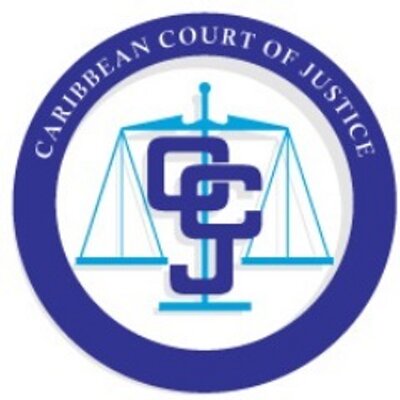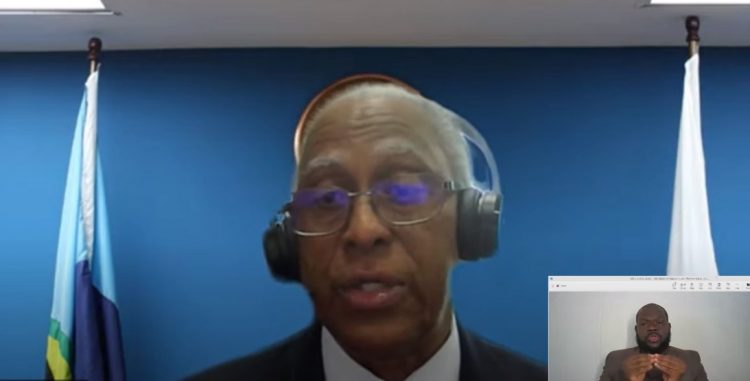 The Caribbean Court of Justice (CCJ) in a majority judgment has ruled that former manager of the New Building Society (NBS), Maurice Arjoon, who was found to have been wrongfully dismissed, being entitled to accrued pension of some $59 million, is not also entitled to severance benefits.
The Caribbean Court of Justice (CCJ) in a majority judgment has ruled that former manager of the New Building Society (NBS), Maurice Arjoon, who was found to have been wrongfully dismissed, being entitled to accrued pension of some $59 million, is not also entitled to severance benefits.
The judgment delivery by the court yesterday, saw for the first time ever, the integration of a sign language interpreter who interpreted the proceedings for the benefit of hearing-impaired users of the court.
While affirming a High Court ruling which had awarded the sacked manager more than $79 million in owed benefits, the Trinidad-based apex court for Guyana in October last year had reserved its decision on the issue of Arjoon’s entitlement to the severance component.

Arjoon has already been paid a lump sum of in excess of $59 million, but the legal journey he has had to walk for the past 16 years against the mortgage institution —which had been found to have wrongfully dismissed him in the first place—has been met with appeal after appeal.
In addition to the $59,033,281 already paid, the CCJ in the ruling last October, awarding full pension to Arjoon, had also awarded him the principal sum of $4,144,797 being payment in lieu of notice.
He was then awarded leave pay and passage assistance in the sum of $1,602,459; as well as monthly pension of $372,498 from July 2017 together with interest up to November 1st, 2023.
Additionally, court costs totalling $3,500,000 was awarded to Arjoon against the NBS. The breakdown of court costs awarded by the High Court, Court of Appeal and the CCJ respectively had been $200,000; $800,000 and $2,500,000.
While the Court was unanimous in its decision that Arjoon had been wrongfully dismissed, it was divided in a 3-2 ratio that he was not entitled to be paid severance; with President of the court Justice Adrian Saunders Justices Denys Barrow and Justice Peter Jamadar concurring.
Justices Andrew Burgess and Maureen Rajnauth-Lee dissented.
Justice Barrow who read the lead judgment of the Court, asserted that as a matter of law in Guyana and for the purposes of an award of pension benefits, resignation may in particular circumstances be regarded as retirement.
The majority of the Court reasoned that it may therefore, legitimately be said that what took place with the Appellant (Arjoon) was that he involuntarily retired, or in other words, that he was required to retire in line with NBS’ pension scheme rules allowing for entitlement to pension.
Justice Barrow said that having concluded that Arjoon was to be deemed as having retired, and that he did so in line with the pension scheme rules providing for entitlement to pension, it remained only to determine the pension that would be paid in a normal case of retirement before the scheduled retirement date. Given that the calculation of pension entitlement which was done in the High Court was not disputed before the final appellate court, the award was upheld by the majority.
On the issue of Arjoon receiving severance pay in addition to pension benefits, the lead judgment noted that since pension was to be paid to the Appellant “as if retired,” his argument that severance should be paid since he was terminated and was thus unable to retire, could not succeed.
Justice Barrow explained that were such an argument to succeed, Arjoon would be getting exactly what the statute creating this benefit of severance pay intended that he should not, “that is, both severance pay and pension.”
In separate opinions, Justices Saunders and Jamadar agreed with Justice Barrow’s conclusion that where the Appellant is deemed to have retired, and entitled to pension benefits on this basis, he cannot also be entitled to severance pay under the Termination of Employment and Severance Pay Act (TESPA).
Exceptional
Justice Jamadar further expressed the view that the Appellant was entitled, from the record and in the exceptional circumstances of this case, to a consideration of additional heads of damage, including (i) compensation and/or damages payable and/or other relief under Section 20 of TESPA, and/or (ii) exemplary damages.
Justices Rajnauth-Lee and Burgess concurred with the majority save on the issue of the Appellant’s entitlement to severance pay.
They agreed that the Arjoon was entitled to receive pension benefits, but their reasoning differed from the majority.
They reasoned that under Section 3(2) of TESPA, accrued or earned pension is protected to the extent it is a ‘higher standard of benefit’ contained in an employment agreement. They considered that the Appellant’s pension rights were what they described as being of a higher standard of benefit to which he was entitled by virtue of his contract of employment.
It was against this background they concluded that the Appellant’s pension benefits were accrued or earned wages and that he was entitled to full pension rights under NBS’ pension scheme and the rules.
In relation to severance, the dissenting justices were of the view that Arjoon had been wrongfully dismissed as distinct from ‘being retired,’ and that a severance allowance was a separate and distinct entitlement to pension benefits.
Justice Barrow in reading the court’s ruling, said that given what Justices Rajnauth-Lee and Burgess considered the policy behind Section 21(1) of TESPA as to the payment of severance, they thought it strange that the legislature would have intended to take away an employee’s accrued compensation for doing service over the years, that is, his severance payment, in circumstances where the employee had been wrongfully dismissed, on the sole ground that he was entitled to a pension.
Their conclusion was that there was nothing in Section 21(4) (d) of TESPA which precluded the Appellant receiving his full severance entitlement under TESPA, as well as his accrued pension benefits under his contract of employment.
In its ruling, the majority of the apex court reversed the September 2022 decision of the Guyana Court of Appeal that Arjoon was not entitled to pension benefits; while affirming the July 2017 judgment of High Court Judge Brassington Reynolds with the exception of the order for payment of severance to the Appellant.
Edward A Luckhoo SC with C V Satram, Ron Motilal and Eleanor Luckhoo appeared for Arjoon while Stephen Fraser SC with Teni Housty and Shantel Scott-Lall appeared for the Respondents.
During yesterday’s judgement delivery, the court for the first time had a sign language interpreter in its proceedings for the benefit of hearing-impaired users of the court.
At the open of the proceedings, Justice Saunders said that the innovation to its judgment delivery practise was an important one stating that in accordance with its strategic plan, the mission of the court is the provision of “accessible, fair and efficient justice” to the people and states of the Caribbean Community.
He said it was part of the court’s continued efforts at accessibility and inclusivity in particular for persons with disabilities with one of those measures being the integration of sign language into the judgment delivery process.
The CCJ in a previous press statement announcing the introduction of the sign language interpreter had underscored that its mission was to provide accessible, fair, and efficient justice to the people and states of the Caribbean Community.
Access to justice it said is a fundamental principle of the rule of law; while adding that in the context of persons with disabilities, access to justice requires that judiciaries, inclusive of judicial officers and court staff, take all necessary steps to provide fair, transparent, inclusive, effective, non-discriminatory, and accountable services for court users and employees alike.
According to the release, it was against this backdrop that, in 2022, President Saunders established the CCJ Committee for Improving Access to Justice for Persons with Disabilities to develop policies and guidelines to create an accessible and inclusive court.
The Committee, the release had said, led by Justice Rajnauth-Lee, spearheaded the new initiative, while noting that the initiative is part of a broader commitment and the court’s continued efforts to enhance its accessibility and inclusivity.
“The CCJ remains dedicated in its resolve to foster an accessible and inclusive court and workplace,” the press statement said.
Background
Back in July of 2017, Justice Reynolds, after ruling that the dismissal was wrongful, ordered NBS to pay the sacked manager more than $79 million in owed benefits for pension and severance.
In September of 2022, the Court of Appeal in a unanimous decision affirmed Justice Reynolds’ ruling that Arjoon’s dismissal was wrongful; though it reduced the award to him for pension from $59,033,281 to $18,817,432.
Acting Chancellor Yonette Cummings-Edwards had said that Justice Reynolds was right to have awarded pension along with severance and benefits; but said the Court had found that in accordance with TESPA, it was only $18,817,432 to which Arjoon was entitled—from the date of his employment on December 1st, 1979 to his dismissal on August 13th, 2007.
The Chancellor had referenced the evidence that Arjoon had contributed over $6 million while the NBS had contributed over $12 million, which brought it to a total of $18,817,432.
“In our view, Arjoon is entitled to receive those contributions “subject to any indebtedness” to the NBS…,” she had said, while adding that with his employment having ceased, no further pension contribution or pension rights were in place.
Justice Reynolds had awarded full pension up to the date of dismissal and to when Arjoon would have retired.
NBS’ challenge had been that the award by Justice of Appeal, Rishi Persaud of $59,033,281 to Arjoon for pension was erroneous.
That sum was part of the more than $79 million, which had been earlier awarded to Arjoon by High Court Justice Reynolds, who had found that Arjoon was entitled to be compensated accordingly for severance benefits, pension and loss of earnings.
The position of the mortgage-lending institution was that pension could not be awarded together with severance and other benefits when an employee is terminated or dismissed.’
Following Justice Persaud’s ruling in December of 2017 that Arjoon be paid the $59,033,281 for pension, it was only after the successful execution of a levy a month later that the mortgage lending institution wrote Arjoon a cheque for that payment in full.
A computation from estimates submitted by attorneys on both sides had pegged the total award of damages at $79,282,801 which Justice Reynolds granted on July 20th of 2017.
Justice Persaud had, however, stayed the remaining $20,249,801 which was awarded to the sacked manager for severance.
Among the grounds on which it appealed the High Court’s ruling, the Society termed Justice Reynolds’ decision erroneous, arguing that pension could not be awarded together with severance and other benefits, when an employee is terminated or dismissed.
In its challenge to the Full Bench of the Court of Appeal—comprising the Chancellor, Justice Persaud and Justice Franklyn Holder—NBS argued, among other things, that the $59,033,281 was not due to Arjoon for pension, even on the premise that he was entitled to it for his service to the bank.
Luckhoo had argued that the central issue in the case was whether his client complied with the bank’s regulations for effecting the withdrawal in question, given that the holder of the account in question from which certain withdrawals were made, was overseas at the time.
He argued that in answer to the question of whether the transaction amounted to misconduct on Arjoon’s part, there was no evidence from the Society to so substantiate, though that has been its contention.
Luckhoo said that in fact, the evidence before the court from the bank’s own auditor and other employees who testified at the trial, has been that the former manager complied with every regulation he ought to have followed as well as his subordinates.
The lawyer had said, too, that the power-of-attorney of the account holder—Bibi Khan—by which the withdrawal was authorized, was found to have been valid as reflected by the records of the Deeds Registry, as the Court also found.
He said that though Khan had visited the bank and merely said that she did not authorize those withdrawals, there has been no evidence before the court that it was not her who had authorized the withdrawals.
In its challenge to the High Court ruling, NBS had argued among other things, that on the basis of the trial judge’s conclusion that Arjoon was “wrongfully dismissed,” he was not entitled to severance pay by virtue of his status and contracts and according to the Termination of Employment and Severance Pay Act.
On June 12th, 2007, Arjoon and two other managers, Kent Vincent, Operations Manager, and Kissoon Baldeo, Assistant Mortgage Manager, had their services terminated after millions were discovered missing from the account of Bibi Khan.
Arjoon was interdicted from duty before being dismissed. The trio, along with several other employees of the bank, were charged in the matter but they were later freed after Khan repeatedly failed to attend court hearings.
After the charge against him was thrown out, Arjoon subsequently filed the lawsuit against the Society, for wrongful dismissal.
Late Ombudsman Justice Winston Moore had concluded that the three managers suffered a “grave injustice” as he found that there was insufficient evidence to suggest that the trio was guilty, let alone to successfully prosecute them.









